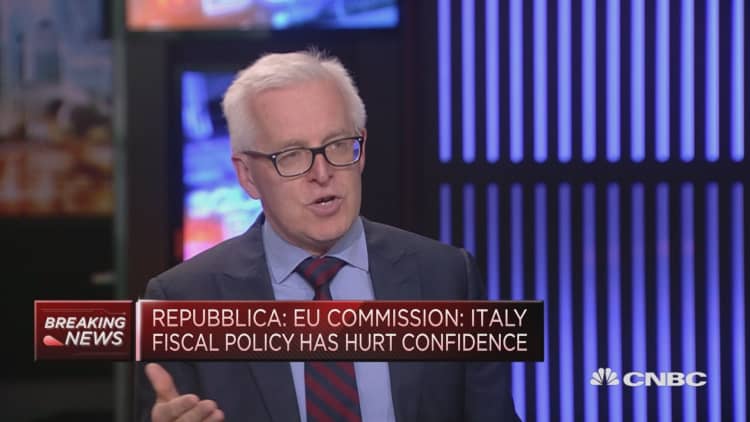The European Commission, the EU's executive arm, announced Wednesday that disciplinary proceedings against Italy are warranted because it's breaking fiscal rules over its rising public debt.
The Commission said that in its latest assessment of member states' compliance with deficit and debt rules, it had concluded that when it comes to Italy "a debt-based EDP is warranted."
An EDP stands for an "Excessive Deficit Procedure" and is an action launched by the European Commission against any EU member state that exceeds the budgetary deficit ceiling or fails to reduce their debts. If an EDP went ahead, Italy could face a fine of around 3 billion euros ($3.4 billion), according to some reports.
"(The report) concludes that the debt criterion is not complied with and thus a debt-based excessive deficit procedure is warranted," Valdis Dombrovskis, the EU Commission vice-president for the euro and social dialogue, said at a press conference.
"To be clear, today we are not opening the EDP. First, EU member states have to give their views on ... the report and the (EU's) Economic and Financial Committee has two weeks to form its opinion on our conclusions. But it's much more than just about the procedure, when we look at the Italian economy we see the damage that recent policy choices are doing."
Worryingly for the Commission, Italy (Europe's third-largest economy) has the second-highest debt pile in the EU (expected to reach 133.7% this year) and was asked to explain why its debt had risen in 2018.
Dombrovskis said the Commission estimated that Italy's spending to service its debts in 2018 turned out to be 2.2 billion euros higher than expected in its 2018 spring forecast. He added that the country pays as much toward its debt servicing as it does toward its entire education system.
"Growth has come to almost a halt ... and we now expect the Italian debt (to GDP) ratio to rise in 2019 and 2020 to over 135%," he said.
Italian banking stocks fell 1% on the announcement Wednesday and the country's bond prices (the amount investors will pay to hold Italian debt) also declined, signaling a drop in risk appetite toward the country.

The Commission presented what is known as its Semester 2019 Spring Package on Wednesday which amounts to 27 country-specific recommendations which set out the Commission's economic and social policy guidance for member states for the next 12 to 18 months.
Italy's coalition government — a fractious alliance between the euroskeptic Lega party and anti-establishment Five Star Movement — has been on a collision course with the European Commission since it announced its 2019 budget plans which foresaw the coalition increasing spending and breaking a budget deficit target previously agreed by the former government.
The coalition initially agreed to lower its deficit target, to 2.04%, but then revised this upwards again.
The friction has put Economy Minister Giovanni Tria in a tricky position trying to navigate between Lega and M5S leaders' demands for more spending and the Commission's demands for less. He promised the Commission that the 2020 budget would be compliant with the Commission's rules.
It's likely that the EU will want to avoid launching punitive measures against Italy given concerns over rising euroskepticism in the country. EU Commissioner Pierre Moscovici said Wednesday that the "door remains open to avoid a disciplinary procedure against Italy."
Italy's Prime Minister Giuseppe Conte (who does not belong to either the Lega party or M5S) said he would do his utmost to avoid any EU procedure, Reuters reported.
Earlier on Wednesday, however, the Lega party's economic chief Claudio Borghi said the party would not accept any tightening measures this year and that Tria must take "a hard line on EU budget talks," Reuters said. Whether that bullish stance will continue in the face of potential punishment from the EU remains to be seen.


